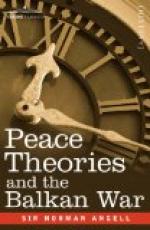We are sometimes told that it is the spirit of nationality—the desire to be of your place and locality—that makes war. That is not so. It is the desire of other men that you shall not be of your place and locality, of your habits and traditions, but of theirs. Not the desire of nationality, but the desire to destroy nationality is what makes the wars of nationality. If the Germans did not think that the retention of Polish or Alsatian nationality might hamper them in the art of war, hamper them in the imposition of force on some other groups, there would be no attempt to crush out this special possession of the Poles and Alsatians. It is the belief in force and a preference for settling things by force instead of by agreement that threatens or destroys nationality. And I have given an indication of the fact that it is not merely war, but the preparation for war, implying as it does great homogeneity in states and centralised bureaucratic control, which is to-day the great enemy of nationality. Before this tendency to centralisation which military necessity sets up much that gives colour and charm to European life is disappearing. And yet we are told that it is the Pacifists who are the enemy of nationality, and we are led to believe that in some way the war system in Europe stands for the preservation of nationality!
[Footnote 3: Review of Reviews, November, 1912.]
[Footnote 4: In the “Daily Mail,” to whose Editor I am indebted for permission to reprint it.]
CHAPTER IV.
TURKISH IDEALS IN OUR POLITICAL THOUGHT.
This war and “the Turks of Britain and Prussia”—The Anglo-Saxon and opposed ideals—Mr. C. Chesterton’s case for “killing and being killed” as the best method of settling differences—Its application to Civil Conflicts—As in Spanish-America—The difference between Devonshire and Venezuela—Will the Balkans adopt the Turco-Venezuelan political ideals or the British?
An English political writer remarked, on it becoming evident that the Christian States were driving back the Turks: “This is a staggering blow to all the Turks—those of England and Prussia as well as those of Turkey.”
But, of course, the British and Prussian Turks will never see it—like the Bourbons, they learn not. Here is a typically military system, the work of “born fighters” which has gone down in welter before the assaults of much less military States, the chief of which, indeed, has grown up in what Captain von Herbert has called, with some contempt, “stagnant and enfeebling peace conditions,” formed by the people whom the Turks regarded as quite unfit to be made into warriors; whom they regarded much as some Europeans regard the Jews. It is the Christian populations of the Balkans who were the traders and workers—those brought most under economic influences; it was the Turks who escaped those influences. A few years since, I wrote:




